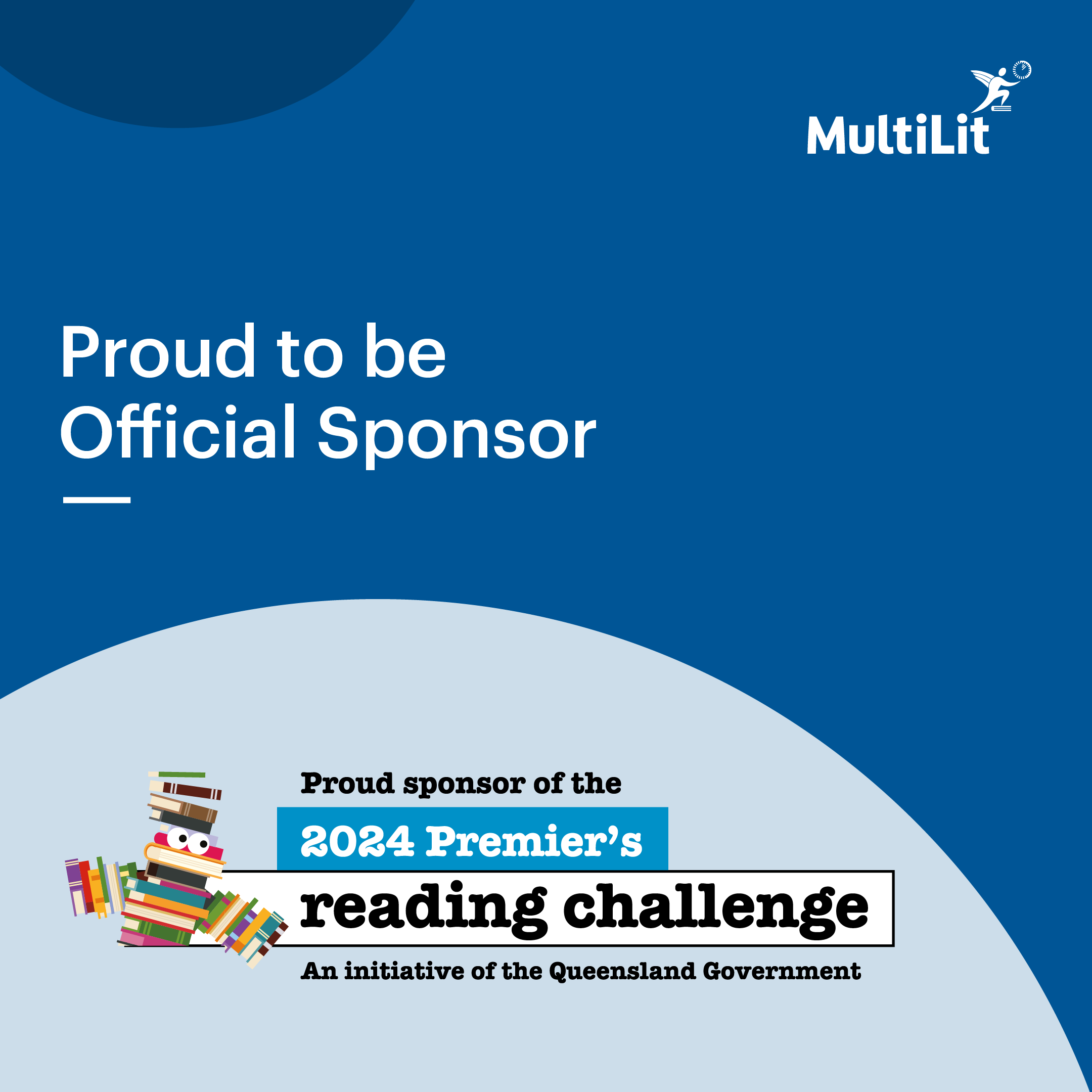MultiLit is an official sponsor of the 2024 Premier’s Reading Challenge, an initiative of the Queensland Government designed to encourage students to develop a love of reading.
It is the second year MultiLit has sponsored the event, which runs from April through to October and is open to children in early childhood centres through to Year 9.
MultiLit Chairman Emeritus Professor Kevin Wheldall AM said the Premier’s Reading Challenge was a critical part of the school education calendar that acknowledged the importance of literacy for a child’s educational and life prospects.

“As the thousands of Queensland school children who are looking forward to taking part in the Premier’s Reading Challenge will know, settling down with a good book is one of life’s true joys,” he said.
“Schools and teachers play a critical role in supporting young people to develop sound literacy skills, which for many don’t come naturally or easily.
“Fortunately, there’s a significant body of evidence that informs how we can support more students to learn to read and learn to love reading.” (See tips attached).
“Queensland’s new Reading Commitment, which includes a focus on evidence-based explicit and systematic teaching of the foundational literacy skills, is a significant step in the right direction and has tremendous potential to transform education outcomes for children.”
Announced last October, the Reading Commitment has coincided with a surge in demand for MultiLit’s evidence-based literacy programs across Queensland schools. Uptake of its InitiaLit program for Foundation to Year 2 classrooms increased almost 30 per cent over the prior year.
“While the Science of Reading isn’t new, more and more teachers are coming to understand and appreciate how we learn to read and the evidence supporting some teaching approaches over others,” said Monica Wright, MultiLit General Manager, Queensland.
“While learning to talk comes naturally for most, the same cannot be said about learning to read, with a majority of children requiring explicit teaching in order to develop this complex skill.
“InitiaLit aligns with the evidence in that it starts with teaching children the relationships between letters and sounds systematically and sequentially so they can learn to decode words and go on to become proficient readers.
“This sets them up for success in all aspects of their schooling and life.”
A spokesperson for the Queensland Department of Education said the 2024 Premier’s Reading Challenge – now in its 19th year – had begun.
“The department would like to thank MultiLit for continuing as an official sponsor and appreciates their continued support,” the spokesperson said.
“The program, coordinated by the Department of Education, is not a competition but a way to encourage students to develop a love of reading for life.”
Tips for supporting children’s reading
At school, teachers can:
- Adopt systematic synthetic phonics teaching, which has been found to be the most effective method for teaching the 26 letter or letter combinations (graphemes) and 44 speech sounds (phonemes) to enable students to decode (sound out) words.
- Ensure children are taught the literacy sub-skills – phonemic awareness, phonics, language comprehension, vocabulary, fluency – in an explicit manner.
- Use decodable readers so that beginning readers can apply their emerging phonic knowledge and phonemic awareness at the text level and develop their confidence as readers.
- Employ quality children’s literature to develop vocabulary and language comprehension.
At home, parents can:
- Model reading behaviour by visiting libraries and reading themselves.
- Encourage children to engage with text by reading to them regularly, including storybooks, poems, recipes, or signs.
- Support children to develop their decoding skills by ‘sounding out’ unfamiliar words (avoid encouraging developing readers to guess using picture cues, which can cause problems down the track).
- When listening to children read, it is really helpful to talk about what is happening in the text. You can do this by asking children questions along the way and by modelling ‘think aloud’ strategies such as:
– making a comment about the story
– identifying connections
– asking a question
– making a prediction related to what’s being read - For beginning readers, decodable readers help children practise their newly acquired phonics knowledge and skills while also building their confidence. Rich-language picture books will assist with vocabulary development and encourage a love of reading.
Need book ideas?
Here is a list of engaging picture books as recommended by the team at MultiLit. All are available at the MultiLit Bookshop, along with a comprehensive range of decodable readers.
Dugong Magic by Deborah Kelly, Lisa Stewart (for ages 5+)
Edward the Emu by Sheena Knowles, Rod Clement (for ages 2-6 )
Jetty Jumping by Andrea Rowe, Hannah Sommerville (for ages 3+)
Magic Beach by Alison Lester (for ages 3-5)
Mum’s Elephant by Maureen Jipiyiliya Nampijinpa O’Keefe, Christina Booth (for ages 0-8)
My Two Blankets by Irena Kobald, Freya Blackwood (for ages 6-9)
Something Wonderful by Raewyn Caisley, Karen Blair (for ages 3-5)
The Day the Crayons Quit by Drew Daywalt, Oliver Jeffers (for ages 3-6)
The Snail and the Whale by Julia Donaldson, Axel Scheffler (for ages 2-5)
The Spotty Sock Mystery by Anna Notley, Heidi Cooper Smith (for ages 4+)
Today We Have No Plans by Jane Godwin, Anna Walker (for ages 3-8)